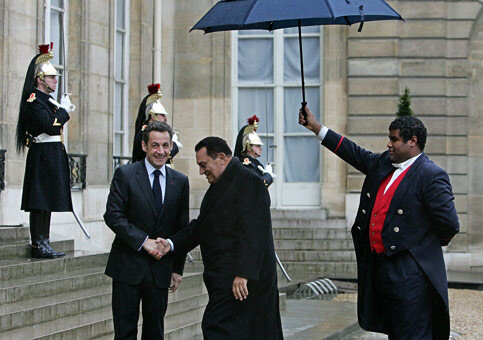The Electronic Intifada 18 February 2009

Egyptian President Hosni Mubarak is greeted by his French counterpart, Nicolas Sarkozy, in Paris for a meeting where Egypt may have sabotaged a French-initiated prisoner exchange between Hamas and Israel. (Eco Clement/UPI)
One of the major achievements of the Israeli revisionist historians has been to break down Israeli myths surrounding the establishment of the State of Israel. A key myth has been the claim that Israel is surrounded by hostile Arab regimes. While this claim has been debunked, even mocked, by many Arabs who accuse their regimes of not only collaboration with Israel but also complicity in the continuing suppression of Palestinian resistance movements, that collaboration has now been documented and exposed with the unearthing of official records. This history came alive during the recent war on Gaza and the Egyptian government’s (and other Arab governments’) complicity in this war provided a clear idea of the organic relationship between Israel and some of those regimes which do not refrain from or hesitate to sacrifice the Palestinian question for their own political ends.
The complicity of the Egyptian regime extends to the negotiations mediated by Cairo. In fact, that regime is not a mediator between two sides or an honest deal maker; its interests meet those of Israel to the extent that it is functioning as a broker on behalf of Israel. The war on Gaza left us with one eye set on the scenes of carnage in Gaza itself and another on Cairo, where the Egyptian negotiating team was trying to pressure the Palestinians (through Hamas) into surrender, something that Israel was not able to achieve by sheer military force. The international outcry, Hamas’ ability to absorb the Israeli attacks and the resolve of Palestinians in Gaza provided the Hamas delegation in Cairo with a political leverage that allowed it to resist Egyptian pressure and intimidation. And as has been revealed through some recent leaks to the press, the Egyptians have utilized various intimidating techniques in order to force Hamas into accepting the terms proposed by Israel. It may be a matter of time before we know those details which will reinforce the idea that the Egyptian negotiating team wanted to impose the Israeli terms rather than negotiate a fair agreement. An indication of Egypt’s readiness to push Hamas into surrender was the original Egyptian proposal to discuss a 10- to 15-year ceasefire between Hamas and Israel. Hamas’ refusal to negotiate such a long-term agreement finally led to a negotiation of an 18-month agreement. As revealed by confidential sources, below is what the Egyptians have been proposing in terms of a two-phase agreement, followed by a Hamas counter-proposal.
Phase one:
1. Hamas shall be the party announcing the ceasefire and the terms of the agreement;
2. Hamas shall provide guarantees to prevent digging tunnels and trading in illegal goods (in reference to weapons);
3. Hamas shall put in place a mechanism by which it punishes those who violate the terms of item 1;
4. There will be a partial (80 percent), and not full, lifting of the blockade;
5. The blockade shall include all material that can be possibly used in the making of rockets;
6. The Israeli crossings will be open if Hamas is able to fulfill the demands spelled out in items 1 and 2.
Phase one does not include any concessions or commitments by the Israelis. Those would be offered in phase two of the agreement. In other words, phase two will come as a reward for Hamas if it shows willingness and ability to honor the terms of phase one. The Egyptians have tried hard to keep the Rafah crossing off the agenda and to discuss it in phase two instead of phase one, again as a reward for Hamas for fulfilling phase one of the agreement. Thus, phase two includes the following items:
1. Israel shall be ready to negotiate new arrangements regarding the Rafah crossing, including a proposal to move the international monitors from the Israeli side to the Egyptian side (with the international monitors being on the Israeli side, they can be easily manipulated by Israel);
2. There shall be an unrestricted flow of food and aid into Gaza.
It is worth noting as well that the Egyptians, in return, have offered the Palestinians to deactivate all unexploded missiles to ensure the safety of the Palestinians.
Aside from the fact that Israel’s commitments to the agreement are delayed until phase two, acceptance of the phase one terms would eventually turn Hamas into another Palestinian Authority whose mission is to guard Israeli interests and punish the Palestinians who break the terms of the agreement. This is especially true for those who, under any form of siege, will be involved in the tunnels trade and smuggling. Aware of this trap and unwilling to accept the Egyptian proposal as is, Hamas has been demanding the following:
1. Egypt shall be the party responsible for announcing the ceasefire and the terms of the agreement;
2. The blockade shall be immediately lifted and all crossings opened, including Rafah, to allow the import of food and aid. The monitoring of the Rafah crossing shall be the responsibility of both Hamas and the Palestinian Authority until a new Palestinian government is formed;
3. There shall be an agreement over a reconstruction plan that would allow the import of all necessary material;
4. There shall be an immediate unrestricted flow of aid;
5. Hamas offers no commitment to punish the violators;
6. Hamas gives no guarantee to stop the import of weapons.
A major sticking point, as Al-Jazeera has indicated, has been which party shall announce the ceasefire and its details. By asking Hamas to unilaterally declare the ceasefire, Egypt is absolving itself from any responsibility to secure Israeli commitments to the ceasefire and to the details of the agreement. In sum, the Egyptians want to impose their terms of the agreement, ask Hamas to declare a ceasefire and the details of the agreement and then leave it up to the Israelis to accept or refuse what is being proposed. Hamas, however, wants Egypt to announce the terms of the agreement. By doing so, Egypt is expected to secure some Israeli guarantees to honor the agreement. More importantly, Egypt, and not Hamas, is then responsible for convincing other Palestinian parties of the terms of the agreement. This would prevent Hamas from turning against those Palestinians who may not consider the agreement to be binding.
What will transpire in the near future will give a clearer picture of where the Egyptians and the Palestinians have been able to agree. It is clear that the Egyptian negotiating team, headed by Omar Suleiman, is eager to achieve two goals. One is to restore a key Egyptian role in the region, especially in the context of the Palestinian-Israeli conflict. The Egyptian government was caught off guard with the Hamas takeover of Gaza in June 2007 and has come out empty-handed after trying to pressure Hamas to renew the ceasefire with Israel back in December. Moreover, the Egyptian regime’s inability to strike a deal with Hamas for the release of captured Israeli corporal Gilad Shalit has further damaged its reputation as an important regional player.
Egypt’s determination to have the Shalit file in its hands, in an effort to restore some credibility for its regional role, explains the recent developments regarding that issue. Israel had agreed to negotiate Shalit’s release in a separate agreement. France was mediating between Hamas and Israel for a prisoner exchange and might have been close to reaching an agreement agreeable to both parties. However, Israel’s recent demand to make Shalit’s release part of the overall agreement and even tie it to the opening of the crossings is a new position. It appears that Egypt sabotaged the French initiative after Hosni Mubarak’s visit to France last week. Ehud Olmert might have been hoping for Shalit’s release before a new Israeli government is formed in order to score a victory before his departure. Egypt is not willing to let go of the Shalit file and wants to lead the negotiations on that issue itself. Israel’s new position should be read as means of pressuring Egypt to conclude an agreement on a prisoner exchange very soon or let another party do it.
The second goal is to reach an agreement that would be acceptable to Israel, and by extension, to the United States. But Suleiman’s eagerness to please Israel and the US has a broader objective. Suleiman wants to prove that he is the man in control, and behind him, the military and intelligence establishment. Suleiman, and the military establishment in general, are not very keen on the idea of Gamal Mubarak succeeding his father. They do not see him as “the son of the military establishment” and his leadership of Egypt will put an end to a trend that has been in place since 1952, whereby the president of the country is a military person whose loyalty and affiliation are to that establishment. While in practical terms Gamal’s rule may not differ from that of his father, it agonizes an old establishment such as the Egyptian military to see the chain of command going to the president breaking or changing. What we may be witnessing now, in terms of the dynamics of the negotiations, may reflect an internal power struggle in Egypt. Yet again the Palestinians and the Palestine question are the victims of an Arab regime pursuing its own interests and sacrificing Palestinian aspirations for the sake of its own survival.
Editor’s note: Due to an editing error, this article originally stated that Hamas would guarantee the halting of import of weapons to Gaza (point 6 of Hamas’ demands). The above version is corrected.
Amal Ghazal is an assistant professor of modern Middle Eastern history at Dalhousie University in Halifax, Canada..


